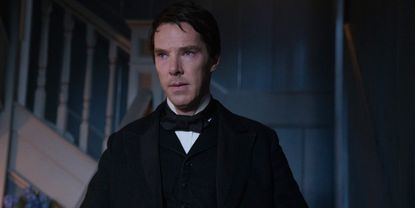How the Toronto International Film Festival got deadly serious
Forget Angelenos dancing on cars. This year's festival is all about humanity on the brink.


Last week, while Hurricane Irma was still devastating the Caribbean on its way to the United States, the Toronto International Film Festival was screening The Florida Project — a movie that illustrates just what can be lost when storms batter the poor.
Writer-director Sean Baker's film is one of the year's best: a funny/sad slice-of-life that hunkers down in Orlando with an unemployed single mother and her vivacious troublemaker kid, as they eke out a living in and around a cheap motel run by a benevolent manager (played by a magnificent Willem Dafoe). An inspired mix of Little Rascals hijinks and neorealist art, The Florida Project is clear-eyed about how bad choices (or lack of choices) can condemn some folks to living on the margins.
But the movie's also funny, lively, empathetic. Yes, it's a critique of the inadequacies of American consumer culture — tellingly set just outside the Disney resorts. But it also argues emphatically that all kinds of people are worth preserving, even in places that may strike us as tawdry and squalid. And that's a positive message to hear, at a time when human society always seems on the verge of total collapse.
Subscribe to The Week
Escape your echo chamber. Get the facts behind the news, plus analysis from multiple perspectives.

Sign up for The Week's Free Newsletters
From our morning news briefing to a weekly Good News Newsletter, get the best of The Week delivered directly to your inbox.
From our morning news briefing to a weekly Good News Newsletter, get the best of The Week delivered directly to your inbox.
Is it frivolous to be spending a week watching movies and spotting celebrities, when so much else is going on in the world? The fest-goers I've talked to in 2017 — in lines and over meals — have been distracted to some extent by the hubbub outside the festival bubble. But we were all just as anxious one September ago, when TIFF coincided with one of the tenser weeks of the presidential campaign. Last year a lot of us from the States came to Toronto already edgy about the unknowns of the election. This year, we've nearly all spent months living in a constant state of emergency — which may be why more TIFF-goers have seemed eager to blow off steam.
No matter what the audiences have had in mind though, the filmmakers came in this year with something to say about the state of the things. In 2016, the big movies everyone rushed to see in Toronto were La La Land and Moonlight, two relatively light or personal films that became surprise Oscar powerhouses. This year, one of the most in-demand entries has been Darren Aronofsky's Mother!, an art-horror exercise that arrived shrouded in secrecy. Finally unveiled, Mother! turned out to be an angry, disturbing film about the state of humanity and planet Earth.
Jennifer Lawrence and Javier Bardem star as a married couple living a bucolic lifestyle in a house out in the country, who see their happiness disrupted by a series of unwanted guests. But that's just a rough outline of the premise. Mother! operates effectively as a stylish, intense thriller, plunging its heroes into unexpected chaos; but it's also working as both a specific and a general metaphor. I won't tell you the specific one, because it's better for viewers to discover that for themselves. (Not everybody I've talked to has cracked Aronofsky's code, which I find surprising.) But in the more general sense, the film is about how we're all unruly houseguests, wrecking our world with selfishness, violence, and misguided priorities.
Lawrence is terrific in Mother!, even as she's playing an idea more than a person. Hers is one of several magnificent performances I've seen from accomplished young actresses in Toronto this year. On the same day as The Florida Project, I saw Saorsie Ronan play two very different, equally compelling versions of blossoming womanhood: one a Sacramento teen circa 2003, in Lady Bird; the other an upper-class British music student circa 1962, in an adaptation of Ian McEwan's novel On Chesil Beach.
Writer-director Greta Gerwig's Lady Bird is a wonder: an honest and funny coming-of-age story about a self-absorbed high-schooler learning to appreciate where she came from. Ronan looks and acts like a reasonable facsimile of her director at a younger age, coming across like a prototype for the lovably lost New Yorker Gerwig played in Noah Baumbach's Frances Ha (which she co-wrote). Gerwig's already proven she has an ear for snappy-but-believable dialogue. Here though, she pulls back just a bit, sacrificing laughs to confront how her younger self could be casually cruel to friends and family — in part because she was embarrassed by being a struggling middle-class kid in a private school full of the rich.
On Chesil Beach (which has a screenplay by McEwan himself) is less shaggy and more literary ... and frankly a bit too staid, flattening out the roiling, largely internalized emotions that the characters grappled with in the book. But Ronan is terrific as an upper crust rebel who likes to think of herself as holding progressive attitudes, until a disastrous wedding night with her husband exposes her hangups about sex. The intricate flashback structure cleverly digs into the roots of the newlyweds' troubles — and their tragic lack of communication. But it's Ronan's performance that really makes her character's romantic desires and psychological blocks come to life.
It's notable that both of Ronan's films are period-pieces (even if one only looks back 15 years), because increasingly it seems like this is one of the toughest tricks for writers, directors, actors, and even hairstylists to pull off: to recreate the past in a way that feels plausible, and not stagey.
On Chesil Beach and Lady Bird manage well. Less successful is The Current War, which looks back at the late 19th century AC/DC squabbles between Thomas Edison and George Westinghouse. Benedict Cumberbatch and Michael Shannon are electrifying (pun partially intended) as the two inventors. Yet in a film about the birth of modernity, the characters come across as too 21st century, conversing with a looseness that feels like a shallow 2017 take on the 1880s. They're the "fun" versions of these noted scientists — realism be damned.
On the flip-side, whatever strange alchemy was involved with turning Gary Oldman into Winston Churchill for Darkest Hour … well, let's just say it rendered him unrecognizable as the man who once played Sid Vicious. Oldman's Churchill is animated in a way that Edison and Westinghouse in The Current War are not, even under the heavy layers of fake fat the actor is wearing. He talks like an embattled British politician from the 1940s, but also expresses doubts, irritations, and affections that make him seem like a multidimensional human.
The bulk of Darkest Hour takes place in the days leading up to the evacuation of Dunkirk (also dramatized well recently in both the blockbuster hit Dunkirk and the underseen romance Their Finest). This movie's Churchill rails against fascists, eschews the notion of compromising with the enemy, and treats the working class' voice as the most important — all of which is going to make it very interesting to see which political factions are going to claim this picture as their own when it comes out in the U.S. in November. But whether it confirms or pushes against anyone's worldview, it's hard to deny that the movie's enormously entertaining, and rousing.
Writer-director Robin Dampillo's Cannes Grand Prix-winning BPM (Beats per Minute) also tells a story about the politics of the past that has ongoing connections to our present. The film is mostly a fairly routine romance, between an HIV-positive man and an HIV-negative man in Paris in the early '90s, all set against the backdrop of the international activist ACT UP movement. But while the romance is rote, the many scenes of ACT UP debating and planning protests offers real insight into how modern grassroots resistance organizations operate. At its best, BPM explains why sometimes aggrieved citizens need to take to the streets.
What a movie like BPM also shows is that contemporary resonances can be found where least expected. See also: Molly's Game. (Seriously, see it. It's a rip-roaring crowd-pleaser.) Multi-award-winning writer Aaron Sorkin directs his first feature, adapting Molly Bloom's memoir about running high-stakes poker nights in Los Angeles and New York. As Sorkin has proven over and over in TV shows like The West Wing and movies like Moneyball and The Social Network, he's the master of the fascinating "Did you know?" anecdote. He leans heavy on that skill in this sprawling tale, filled with colorful characters and weird detours. Then, when we least expect it — just like in real life — the Russian mob muscles into Molly's business, and the movie becomes more about the spreading stain of corruption, worldwide.
The chilling documentary The China Hustle doesn't wait long to drop its audience into the pit of despair. Inspired by the kind of idle dude-talk that would make Sorkin jealous, the film explains how the global financial markets have largely been propped up after the 2008 crash by investors pouring money into Chinese companies that are misstating their earnings. Director Jed Rothsetsin initially heard all about this from a hedge fund manager, who has dedicated himself to exposing fraud by short-selling bad stocks. After seeing all the evidence laid out by Rothstein, audiences can walk away from this film feeling infuriated by the persistent lack of government oversight in high-level business decisions — or feeling better that a few good capitalists are trying to solve this problem via the market itself.
As "How can we save ourselves?" thought-exercises go, though, nothing at TIFF so far has topped Downsizing, a constantly surprising science-fiction comedy from the Sideways team of director Alexander Payne and his co-screenwriter Jim Taylor. The film takes place in a near future where scientists have figured out how to miniaturize humans, to reduce both want and waste. Matt Damon stars as one of the people who's chosen to "get small," though when he finds out his new life isn't quite what he was promised, he's pushed to dig deeper into the roots and ramifications of tiny culture.
Downsizing makes some dicey storytelling choices, including introducing a Vietnamese character who speaks comically broken English. Yet for every joke or idea that doesn't work, Downsizing has twice as many that do.
It helps that Payne and Taylor have clearly thought through the ramifications of this strange scientific breakthrough, and that they ultimately treat this movie's big idea as a lens through which to view how humanity tends to react to potentially world-ending crises. Some profit, while still patting themselves on the back for "making a difference." Others bunker away from the encroaching darkness. And some look at the problem right in front of them, and try to solve it.
That's why the two most moving moments of the festival for me so far have come from concluding scenes of people helping people. One of those scenes comes at the end of The Florida Project, and would be a shame to spoil it. But it won't ruin anything to reveal the last line of Downsizing, which is "hasta mañana"… as in "see you tomorrow." That's such a simple sentiment. Yet so reassuring.
Next week: The second half of my TIFF report will include early looks at movies about Bjorn Borg, Billie Jean King, Tonya Harding, and Josef Stalin, as well as new films by Guillermo del Toro, John Woo, Martin McDonagh, and Louis C.K.
Sign up for Today's Best Articles in your inbox
A free daily email with the biggest news stories of the day – and the best features from TheWeek.com
Noel Murray is a freelance writer, living in Arkansas with his wife and two kids. He was one of the co-founders of the late, lamented movie/culture website The Dissolve, and his articles about film, TV, music, and comics currently appear regularly in The A.V. Club, Rolling Stone, Vulture, The Los Angeles Times, and The New York Times.
-
 The ultimate films of 2024 by genre
The ultimate films of 2024 by genreFrom the Magazine In a year dominated by sequels, here are the releases that impressed the critics, from Hollywoodgate and Twisters to Poor Things and Atomic People
By The Week UK Published
-
 The big art stories of 2024
The big art stories of 2024In depth From the rediscovery of a long-lost painting and the year's highest sale price to the artwork eaten by its new owner
By The Week UK Published
-
 Crossword: December 29, 2024
Crossword: December 29, 2024The Week's daily crossword
By The Week Staff Published
-
 Walter Isaacson's 'Elon Musk' can 'scarcely contain its subject'
Walter Isaacson's 'Elon Musk' can 'scarcely contain its subject'The latest biography on the elusive tech mogul is causing a stir among critics
By Theara Coleman Published
-
 Welcome to the new TheWeek.com!
Welcome to the new TheWeek.com!The Explainer Please allow us to reintroduce ourselves
By Jeva Lange Published
-
 The Oscars finale was a heartless disaster
The Oscars finale was a heartless disasterThe Explainer A calculated attempt at emotional manipulation goes very wrong
By Jeva Lange Last updated
-
 Most awkward awards show ever?
Most awkward awards show ever?The Explainer The best, worst, and most shocking moments from a chaotic Golden Globes
By Brendan Morrow Published
-
 The possible silver lining to the Warner Bros. deal
The possible silver lining to the Warner Bros. dealThe Explainer Could what's terrible for theaters be good for creators?
By Jeva Lange Last updated
-
 Jeffrey Wright is the new 'narrator voice'
Jeffrey Wright is the new 'narrator voice'The Explainer Move over, Sam Elliott and Morgan Freeman
By Jeva Lange Published
-
 This week's literary events are the biggest award shows of 2020
This week's literary events are the biggest award shows of 2020feature So long, Oscar. Hello, Booker.
By Jeva Lange Published
-
 What She Dies Tomorrow can teach us about our unshakable obsession with mortality
What She Dies Tomorrow can teach us about our unshakable obsession with mortalityThe Explainer This film isn't about the pandemic. But it can help viewers confront their fears about death.
By Jeva Lange Published